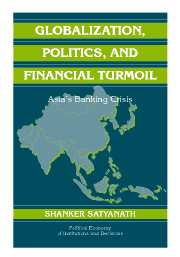Book contents
- Frontmatter
- Contents
- Figures and Tables
- Preface
- GLOBALIZATION, POLITICS, AND FINANCIAL TURMOIL
- 1 Introduction
- 2 Bank Regulation in the Debate over Capital Flow Liberalization
- 3 The Signaling Argument
- 4 Incredible Signaling in Democracies: The Cases of Thailand, South Korea, and the Philippines
- 5 Unorthodox Solutions to the Signaling Problem: The Cases of Malaysia and Indonesia
- 6 Orthodox Solutions to the Signaling Problem: The Cases of Singapore and Hong Kong
- 7 Some Concluding Remarks
- Appendix I The World Bank's Evaluation of Bank Regulatory Environments
- Appendix II Verbal Description of the Equilibrium with Two Signalers
- Appendix III Formal Proof of Equilibrium with Two Signalers
- Bibliography
- Interviews by the Author
- Index
- POLITICAL ECONOMY OF INSTITUTIONS AND DECISIONS
Preface
Published online by Cambridge University Press: 24 July 2009
- Frontmatter
- Contents
- Figures and Tables
- Preface
- GLOBALIZATION, POLITICS, AND FINANCIAL TURMOIL
- 1 Introduction
- 2 Bank Regulation in the Debate over Capital Flow Liberalization
- 3 The Signaling Argument
- 4 Incredible Signaling in Democracies: The Cases of Thailand, South Korea, and the Philippines
- 5 Unorthodox Solutions to the Signaling Problem: The Cases of Malaysia and Indonesia
- 6 Orthodox Solutions to the Signaling Problem: The Cases of Singapore and Hong Kong
- 7 Some Concluding Remarks
- Appendix I The World Bank's Evaluation of Bank Regulatory Environments
- Appendix II Verbal Description of the Equilibrium with Two Signalers
- Appendix III Formal Proof of Equilibrium with Two Signalers
- Bibliography
- Interviews by the Author
- Index
- POLITICAL ECONOMY OF INSTITUTIONS AND DECISIONS
Summary
We now live in a world where capital often moves freely across national borders. In this world, developing countries have increasingly been subjected to devastating financial crises caused by the sudden withdrawal of foreign capital. These crises have had severe humanitarian consequences; in East Asia in 1997–98 some countries experienced economic contractions comparable to levels seen in the Great Depression. How do such crises come about? I focus on a novel causal path, that of miscommunication. I demonstrate why developing democracies are exceptionally vulnerable to breakdowns in communication between financial officials and the chief executive. These breakdowns have disastrous consequences because they result in inadequate bank regulation, which encourages the withdrawal of foreign capital.
This book contributes to three literatures. The first is the literature on globalization of capital. This literature has hitherto paid little attention to how globalization can have disastrous consequences in political environments where there are problems in the credible communication of financial information, and this is a contribution of my book. The second is the literature on the politics of financial crises. It is plausible that the presence of ill-informed chief executives raises the likelihood of financial crises. However, scholars of crises have hitherto been unable to systematically identify where we are likely to observe an ill-informed chief executive, thanks to the absence of any preexisting analytical framework for such an analysis.
- Type
- Chapter
- Information
- Globalization, Politics, and Financial TurmoilAsia's Banking Crisis, pp. xi - xiiPublisher: Cambridge University PressPrint publication year: 2005

